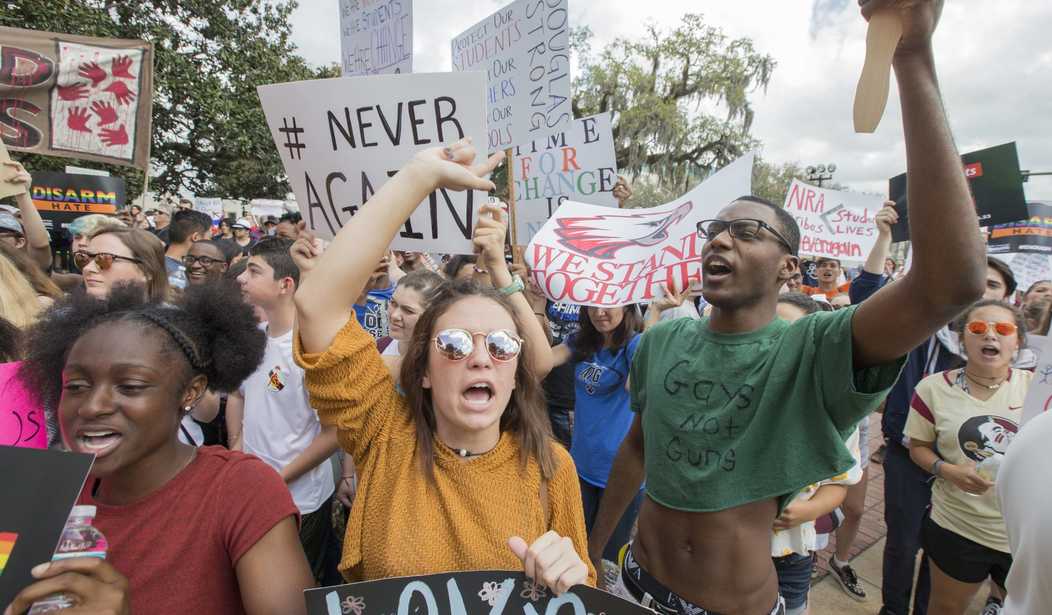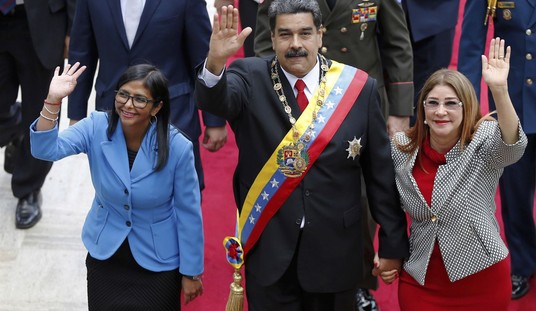The CNN town hall, where students who witnessed the Florida mass shooting voiced their frustrations, challenged politicians, and aired their grievances, was disturbing to watch. Not because of the horrific topic or the apparent trauma on parade, but because it showed us in loud, sarcastic, and bitter detail the power of groupthink.
Herd mentality runs on emotionalism and fear. It stands against reason. It is rooted in reaction instead of rational response. It is driven by instinct in the face of real or perceived threats to one’s survival. It attacks instead of engages. It is, as Robert Heinlein put it, “a hundred bellies and no brain.”
This is what we’re seeing in response to the evil actions of a single murderer in a Florida high school. Students, parents, and teachers (along with a community of political organizers ready and willing to corral them in a single direction) are reacting to a nightmarish event because they’re frightened. This is the germination of a mob.
Back in 1915, sociologist Wilfred Trotter wrote the Instincts of the Herd in Peace and War and explained why this gravitation to the mob happens: because we don’t want to feel alone and vulnerable. When we are faced with cruelty and fear, we become intolerant of isolation. Our response is to experience “an intense and active desire for the company and even physical contact” of other people, and when that communal support is propelled toward a political end to eradicate the threat, one’s power is increased.
The person who wants to be included in the herd becomes “aware of a great accession of confidence, courage, and moral power” that comes with group unity. It’s a power that is dependent on the mob, not on a person’s individual psyche, beliefs, or ability to cope. The threat “draws him to the herd in the first instinctive concentration against the enemy” — whoever that is determined to be in reality or as defined by the herd:
In the presence of this stimulus even such partial and temporary isolation as was possible without it becomes intolerable. The physical presence of the herd, the actual contact and recognition of its members, becomes indispensable. This is no mere functionless desire, for re-embodiment in the herd at once fortifies courage and fills the individual with moral power, enthusiasm, and fortitude.
Every note of disunion is a loss of moral power of incalculable influence; every evidence of union is an equally incalculable gain of moral power.
This need to be empowered on the heels of trauma is intoxicating. It creates a mob high that removes discernment and makes individuals ripe to be manipulated and influenced by groupthink. It fuels disruptive behavior, such as cheers for gun control no matter the facts, a frenzied applause when a lone student stands before a distinguished senator and says “looking at you is like staring down the barrel of an AR-15,” and shouts of approval when this same teenager questions the maternal sensitivities of a woman fighting daily to protect our constitutional rights.
Even more disturbing is how this intoxicating and empowering effect of the mob leads young people, who are still in high school and under the authority of their parents, to yell at perceived “enemies” like NRA spokesperson Dana Loesch: “Burn her!” “I hope you get shot!” “Killer!” “Murderer!” The environment was so hostile, Loesch had to leave protected by armed guards — an irony that should not escape us.
Any adult who encourages these students to join the mob is dehumanizing children and weakening them in the long-term. Children’s terrors are being used to promote a political cause and to infuse their individuality into a mindless herd that is driven by animal instinct. Children who should be protected, educated, and armed with reason are reduced to their most base fears that heighten their sense of loneliness and their need to be a part of a greater group no matter the morality of it.
These children have witnessed true evil, and they’re terrified. They feel alone, and they are grasping for reassurance and empowerment. Many of them have been raised thinking life is free of true evil, that everything is morally relative. But their eyes have been opened to, as Trotter wrote, a “vision of the cruelty which everywhere lies close below the surface of life.”
These children weren’t prepared for such an awakening, not that anyone really can be. But, unlike in times past, children in our age are woefully ill-equipped to see evil for what it is and to respond to it. They have been taught that human progress is leading us to utopia, and only dissenters of the utopian agenda — the mob’s agenda — stand in the way. They have believed the herd lie, a mob doctrine that has been deeply ingrained into them by our educational system, culture, and political system.
This doctrine teaches that “things, on the whole, are fundamentally right, that the universe is congruous with their moral feelings, that seeming cruelty is mercy and apparent indifference is longsuffering.” They have been coddled and lied to about the realities of life by a herd that seeks to control individuals through complacency in times of peace and fear in times of war.
Now that they’ve seen evil for what it is, they are being gathered up into the herd mindset once more, this time for mere survival. They demand that such a horror never happen again, that our society go back to the way it was in which life conforms to their feelings, not their experience. The herd is promising to make that happen, and it is gathering the forces of moral power that come with the herd to achieve the impossible end of utopia. Any dissent or seeming opposition to it is deemed an existential threat.
The mob frenzy leads to increased anger, dehumanization of anyone outside the mob, and inability to look for reasonable, albeit imperfect, solutions to an ongoing problem of evil. It leads our children away from their individuality, the reason of their own minds, and a stable strength based on real, intimate relationships. It feeds them to the gluttonous belly of groupthink.
If parents really want to help their children, they need to teach them the truth about life, good and evil, rights and responsibilities. They need to help their children overcome fear, not by engrafting them into the mob, but by surrounding them with truly functional and healthy communities, beginning with the family and religious groups.
In these close spaces, children will learn the truth about evil, reasonable responses to tragedies, respect for dissenters, and love for their fellow man. They will gain a sustainable strength that will enable them to stand on their own or with others as they face evil with goodness and rationality. They will not mindlessly cheer or frantically demand; they will thoughtfully respond — something that is sadly lacking in our society today.









Join the conversation as a VIP Member